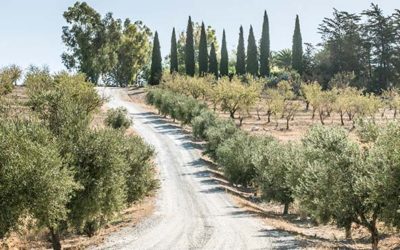Collect for Trinity 17 Almighty God, you have made us for yourself, and our hearts are restless till they find their rest in you: Teach us to offer ourselves to your service, that here we may have your peace, and in the world to come may see you face to face;through...

Praying Together January 14th 2024

Blessing of the Plough
Plough Sunday has its roots in medieval times, when the parish church was often used to store a communal plough in the winter months, then being decorated and blessed before the rhythm of the agricultural season begins once more on Plough Monday.
Collect for Epiphany 2 (Plough Sunday)
Almighty God, in Christ you make all things new: Transform the poverty of our nature by the riches of your grace, and in the renewal of our lives make known your heavenly glory; through Jesus Christ our Lord.
Almighty God, with whom we can do everything,
Without whom we can do nothing:
Open our eyes that we may see thee:
Open our lips that we may praise thee:
Open our hearts that we may know thee:
Through Jesus Christ our Lord. Amen.
An Epiphany Poem
Summer ends when they start selling Christmas cards
Christmas ends when Tesco puts Easter Eggs on the shelves.
And Winter ends when the veil is torn in two.
Heaven and Earth – The Message Bible translation

First this: God created the Heavens and Earth—all you see, all you don’t see. Earth was a soup of nothingness, a bottomless emptiness, an inky blackness. God’s Spirit brooded like a bird above the watery abyss.
God spoke: “Light!”
And light appeared.
God saw that light was good
and separated light from dark.
God named the light Day,
he named the dark Night.
It was evening, it was morning— Day One.
God spoke: “Sky! In the middle of the waters;
separate water from water!”
God made sky.
He separated the water under sky
from the water above sky.
And there it was:
he named sky the Heavens;
It was evening, it was morning— Day Two.
God spoke: “Separate!
Water-beneath-Heaven, gather into one place;
Land, appear!”
And there it was.
God named the land Earth.
He named the pooled water Ocean.
God saw that it was good.
God spoke: “Earth, green up! Grow all varieties
of seed-bearing plants,
Every sort of fruit-bearing tree.”
And there it was.
Earth produced green seed-bearing plants,
all varieties,
And fruit-bearing trees of all sorts.
God saw that it was good.
It was evening, it was morning— Day Three.
God spoke: “Lights! Come out!
Shine in Heaven’s sky!
Separate Day from Night.
Mark seasons and days and years,
Lights in Heaven’s sky to give light to Earth.”
And there it was.
God made two big lights, the larger
to take charge of Day,
The smaller to be in charge of Night;
and he made the stars.
God placed them in the heavenly sky
to light up Earth
And oversee Day and Night,
to separate light and dark.
God saw that it was good.
It was evening, it was morning— Day Four.
God spoke: “Swarm, Ocean, with fish and all sea life!
Birds, fly through the sky over Earth!”
God created the huge whales,
all the swarm of life in the waters,
And every kind and species of flying birds.
God saw that it was good.
God blessed them: “Prosper! Reproduce! Fill Ocean!
Birds, reproduce on Earth!”
It was evening, it was morning— Day Five.
God spoke: “Earth, generate life! Every sort and kind:
cattle and reptiles and wild animals—all kinds.”
And there it was:
wild animals of every kind,
Cattle of all kinds, every sort of reptile and bug.
God saw that it was good.
God spoke: “Let us make human beings in our image, make them
reflecting our nature
So they can be responsible for the fish in the sea,
the birds in the air, the cattle,
And, yes, Earth itself,
and every animal that moves on the face of Earth.”
God created human beings;
he created them godlike,
Reflecting God’s nature.
He created them male and female.
God blessed them:
“Prosper! Reproduce! Fill Earth! Take charge!
Be responsible for fish in the sea and birds in the air,
for every living thing that moves on the face of Earth.”
Then God said, “I’ve given you
every sort of seed-bearing plant on Earth
And every kind of fruit-bearing tree,
given them to you for food.
To all animals and all birds,
everything that moves and breathes,
I give whatever grows out of the ground for food.”
And there it was.
God looked over everything he had made;
it was so good, so very good!
It was evening, it was morning— Day Six.
Instead of a sermonette this week, here’s Psalm 148. On a day when we celebrate God’s creation, there’s nothing I could add…
Psalm 148 – Praise for God’s Universal Glory
Praise the LORD!
Praise the LORD from the heavens;
praise him in the heights!
Praise him, all his angels;
praise him, all his host!
Praise him, sun and moon;
praise him, all you shining stars!
Praise him, you highest heavens,
and you waters above the heavens!
Let them praise the name of the LORD,
for he commanded and they were created.
He established them for ever and ever;
he fixed their bounds, which cannot be passed.
Praise the LORD from the earth,
you sea monsters and all deeps,
fire and hail, snow and frost,
stormy wind fulfilling his command!
Mountains and all hills,
fruit trees and all cedars!
Wild animals and all cattle,
creeping things and flying birds!
Kings of the earth and all peoples,
princes and all rulers of the earth!
Young men and women alike,
old and young together!
Let them praise the name of the LORD,
for his name alone is exalted;
his glory is above earth and heaven.
He has raised up a horn for his people,
praise for all his faithful,
for the people of Israel who are close to him.
Praise the LORD!
Previous Posts
Praying Together 9th October 2022
An Ordination at St Michael and All Angels, Waterville
On Thursday last, 29th September - the feast of Michaelmas - members of all four churches of our Union joined together to witness The Reverend Barbara Irrgang-Buckley being ordained Priest by the Bishop of Tuam Limerick and Killaloe, the Right Reverend Michael...
Praying Together 25th September 2022
Luke 16: 19-31 What will it take to convince you? With thanks to Anselm of Canterbury, and his inspiration Augustine of Hippo, there are two approaches to faith. (Excuse the Latin, but I had five years of it at school and I can’t help showing off sometimes as a...
Praying Together 18th September 2022
Luke 16: 1-13 To whom do we owe our allegiance? You cannot serve God and ‘wealth’ Bah. If ever there was a misleading Biblical translation, that’s it. It’s bad enough when the translated phrase reads ‘You cannot serve God and money’. Neither of those words...
Praying Together – 11 September 2022
Collect for Trinity 13 Almighty God, who called your Church to bear witness that you were in Christ reconciling the world to yourself: Help us to proclaim the good news of your love, that all who hear it may be drawn to you; through him who was lifted up on the...
Arthur and Martha: Christ the King
This is the day we remember that Jesus is the king of all the world and that He is the greatest king of all. Just imagine. Jesus is our very best friend, but He’s a king!
The Road to Emmaus | Luke 24: 13-35
The Road to Emmaus : Luke 24:13-35
Mary’s Story
Hello little one. Pleased to meet you. It’s been an eventful few months while I’ve been waiting for you to arrive. Let me tell you all about it.
It started on an ordinary day. I was going about as normal, feeding the chickens, tidying up and that sort of thing. I wasn’t really concentrating, I was thinking about my wedding to Joseph in a few weeks time.
The Journey to the Cross
The Lent readings tell a familiar story. The story of a journey. A journey to the cross.
Let’s remind ourselves of that journey. After his baptism, Jesus went into the wilderness for forty days and forty very cold nights. The voices of Satan came whispering, tempting, but Jesus refuses to be distracted or tempted.


















